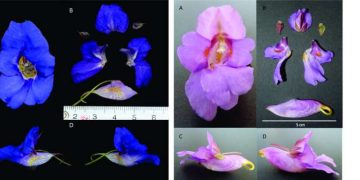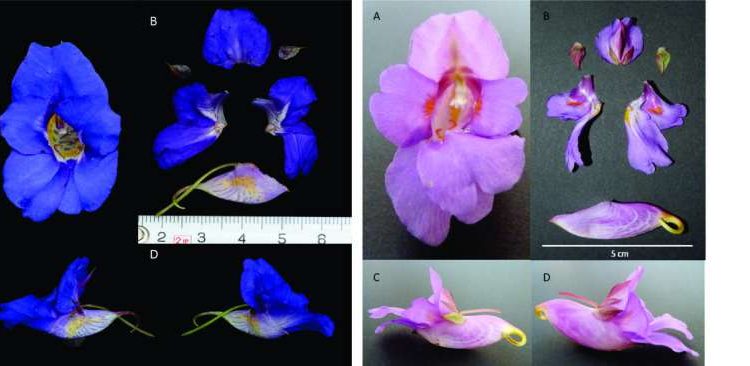Growing in the heart of the world’s deepest valley are two plants that have fooled scientists for decades.
Two species of the “touch-me-not” genus (Impatiens)—the Blue Diamond (Impatiens namchabarwensis) and Toothed Busy Lizzie (Impatiens arguta) are found in the remote Tsangpo Gorge that meanders around the highest peak in the Eastern Himalayas, Mount Namchabarwa.
Both plants are adorned with trumpet-shaped flowers in a spectrum of colors, and their similarities made many scientists believe they belonged to the same species.
But the experts were wrong.
In a recent study published in the Nordic Journal of Botany, researchers from Xi’an Jiaotong-Liverpool University (XJTLU) in China and the University of Bonn in Germany have identified some vital differences between the plants that disentangle their classification and confirm they are separate species.
XJTLU’s Dr. Bastian Steudel, a corresponding author of the study, says, “We are facing a mass extinction of species worldwide, so it is essential to recognize every species and their distribution patterns.
“A species of plant can have flowers with many different colors; just think of the pink and white of a common daisy. So it can be challenging to differentiate between species with similar shapes and habitats, such as I. namchabarwensis and I. arguta. But we have now shown they are pollinated by different insects and have more differences than previously thought.
“Our findings are a small piece in the species identification and distribution puzzle, but plants such as I. namchabarwensis, which are only found in narrow habitats, are often particularly interesting for conservation programs.”
Due to the uncertainty regarding its taxonomy, the study reports that I. namchabarwensis has been neglected by existing literature, including the standard compilation of all known plant species found in China, Flora of China.
A name of its own
Impatiens namchabarwensis was found in 2003 during an excursion to the Eastern Himalaya mountain range and described as a new species in 2005. It quickly circulated in Western countries as a novelty for gardeners who collect species of “touch-me-nots,” especially due to its appealing colors.
As the valley where it was discovered is also the habitat of the widespread species I. arguta, many scientists believed the two plants to be one species.
Dr. Steudel explains, “Every year, new species of plants, animals, and microbes are identified. Sometimes these new species and their suggested names are not accepted by other researchers. They think the organism belongs to an already-known species and consider the new name just an alternative. This process is called synonymization.
“Synonymization is very important; otherwise, everybody would know the species by a different name and communication between experts would be very difficult.”
Despite the value of synonymization, in some cases, the plants are indeed different species and therefore earn the right to a new name. The Blue Diamond (I. namchabarwensis) is such an example.
The researchers observed that I. namchabarwensis is pollinated by hawk moths and tends to live for two to three years, whereas I. arguta is preferred by bumblebees and lives for eight years. They suggest the difference in pollinators is due to the lower petals of the plants facing in slightly different directions; I. arguta creates a platform for its flower visitors with horizontal petals, in contrast to the downward-facing leaves of the I. namchabarwensis.
Dr. Steudel explains the impact of identifying these differences: “It would be a real pity if such a beautiful species as I. namchabarwensis were confined to survive only in collections and be extinct in nature.
“But it would be even worse if all knowledge of the plant species went extinct as well, because it was misclassified.”































